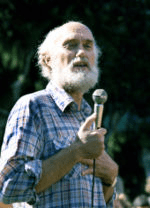
Ram Dass Quotes
Author of the 1971 bestseller Be Here Now, Dr. Richard Alpert, (also known as Ram Dass), is a contemporary spiritual teacher who is dedicated to promoting spiritual growth and awareness. While at Harvard, Alpert’s explorations of human consciousness led him, in collaboration with Timothy Leary, Aldous Huxley, Allen Ginsberg, Ken Kesey, and others, to pursue intensive research with psilocybin, LSD-25, and other psychedelic chemicals. Alpert eventually split from this group and increasingly found his purpose in the Hindu ethic of serving others. He traveled to India where he met his spiritual teacher, the Maharaj-ji, who gave him the name “Ram Dass,” which means “servant of God”.
These life-changing experiences in India inspired him to write about contemporary spirituality and when he returned to the United States in 1969, he embraced a wide variety of spiritual traditions and practices, including yoga, meditation in various schools of Buddhism, Sufi and Jewish studies.
In February 1997, he suffered a stroke, which left him with expressive aphasia. He has said that his stroke was an act of grace and he continues to travel and teach about the nature of consciousness, and about service as a spiritual path, as his health permits. When asked if he could sum up his life’s message Ram Dass replied, “I help people as a way to work on myself, and I work on myself to help people… To me, that’s what the emerging game is all about.”
Image: Photo of author Ram Dass
“I would say that the thrust of my life has been initially about getting free, and then realizing that my freedom is not independent of everybody else. Then I am arriving at that circle where one works on oneself as a gift to other people so that one doesn’t create more suffering. I help people as a work on myself and I work on myself to help people.”
“Be here now.”
“The stroke caused me to lose faith, and it was a cold, cold place, and I suddenly realized it was fierce grace… that turned my life around.”
“Everything in your life is there as a vehicle for your transformation. Use it!”
“I am embarrassed to admit what drew me to psychology. I didn’t want to go to medical school. I was getting good grades in psychology and I was charismatic and people in the psychology department liked me. It was as low a level as that.”
“We are all affecting the world every moment, whether we mean to or not. Our actions and states of mind matter, because we are so deeply interconnected with one another.”
“The spiritual journey is individual, highly personal. It can’t be organized or regulated. It isn’t true that everyone should follow one path. Listen to your own truth.”
“The most exquisite paradox… as soon as you give it all up, you can have it all. As long as you want power, you can’t have it. The minute you don’t want power, you’ll have more than you ever dreamed possible.”
“It is important to expect nothing, to take every experience, including the negative ones, as merely steps on the path, and to proceed.”
“Be patient. You’ll know when it’s time for you to wake up and move ahead.”
“Suffering is the sandpaper of our incarnation. It does its work of shaping us.”
“It is up to the most conscious member of the relationship to create the space for the relationship to grow.”
“Spiritual practices help us move from identifying with the ego to identifying with the soul. Old age does that for you too. It spiritualizes people naturally.”
“The dance goes from realizing that you’re separate (which is the awakening) to then trying to find your way back into the totality of which you are not only a part, but which you are.”
“Healing does not mean going back to the way things were before, but rather allowing what is now to move us closer to God.”
“As long as you have certain desires about how it ought to be you can’t see how it is.”
“The resistance to the unpleasant situation is the root of suffering.”
“There’s much more in any given moment than we usually perceive, and that we ourselves are much more than we usually perceive. When you know that, part of you can stand outside the drama of your life.”
“When you are forced to bear the unbearable something dies in you.
What dies in you is whom you thought you were that couldn’t bear the unbearable.”
– Ram Dass (1931-2019 )
